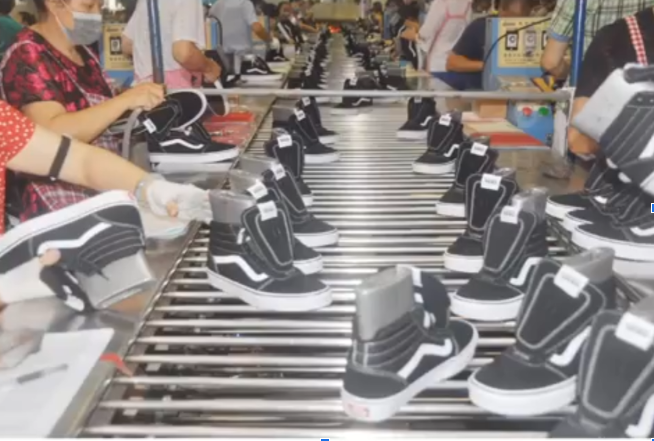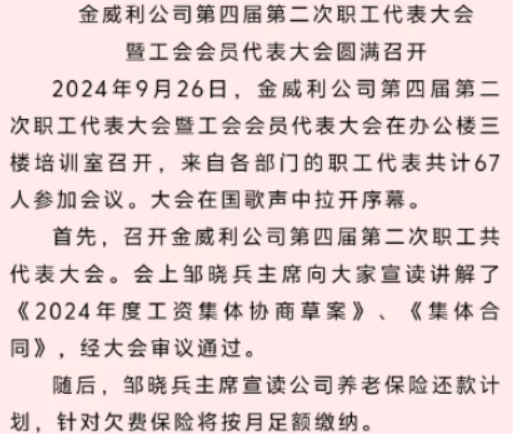A strike at Emei KVE Sporting Goods Co. Ltd in Sichuan Province has brought to light significant issues surrounding labour rights, union governance, and supply chain accountability. The dispute, which began on December 4, 2024, over unpaid social security contributions, ended with the company settling its obligations by the end of the month. However, the incident has raised broader concerns about local union structures' effectiveness, corporate executives' role in union leadership, and the responsibility of international brands like VF Corporation in ensuring ethical practices within their supply chains. This case underscores systemic challenges in labour relations and corporate accountability within China's manufacturing sector.

Workers at Emei KVE Sporting Goods Co. Ltd, based in Leshan, Sichuan Province, staged a strike on 4 December 2024 over allegations of delayed social security payments, according to the social media posts collected online. The company swiftly responded with a public commitment to settle all outstanding pension insurance contributions by 31 December 2024. By 24 December, workers confirmed that the payments had been fulfilled, marking a resolution to the dispute highlighting growing tensions over labour rights and corporate accountability in China's manufacturing sector.
Company background
Founded in 2007, Emei KVE is a major export-oriented shoe manufacturer employing over 6,000 workers at its peak, with an annual production capacity of 12 million pairs of casual sports shoes, according to its website. Its key clients include U.S. brands VANS and REEF and is listed as a licensee on VF 2024 supplier list. However, according to a report in the Securities Market Weekly in September 2024, the company faced severe financial strain after a major client—reportedly VANS, which accounted for over 90% of its operations—abruptly reduced orders and terminated its partnership at the end of 2023, causing a sharp decline in revenue.
The issue
Since 20 November 2024, several employees have alleged online that the company failed to fulfil its legal obligation to pay social insurance. Workers claimed that insurance fees were regularly deducted from their wages but later discovered—often upon leaving the company—that no social security contributions had been made on their behalf. This practice potentially violates Article 60 of China’s Social Insurance Law, which mandates employers to pay social insurance premiums in full and on time while transparently informing employees of payment details. If proven, such noncompliance could trigger penalties under Article 86 of the law, including late payment fines and administrative sanctions amounting to two to three times the unpaid premiums. These allegations, if substantiated, raise serious questions about the company’s labour practices and legal accountability, even before the order cuts.
A model factory union in a model city
Just months before the strike at Emeishan, the municipal union was recognised in 2024 as one of Leshan city’s 2024 model cases. The accolade allegedly highlighted the Emeishan union's efforts to pioneer new approaches to collective consultation, fostering cooperation between enterprises and workers. By gathering over 800 opinions and demands from employees and tailoring consultations to each enterprise's unique conditions, the Emeishan union sought to build a shared interest community.
In mid-November 2024, the Emeishan Municipal Federation of Industry and Commerce, alongside the Municipal Union and the Bureau of Human Resources and Social Security, conducted a comprehensive assessment of collective bargaining across enterprises in the city. The evaluation, carried out from November 19 to 21, reported high effectiveness, with over 98% of workers expressing satisfaction and participation, and 97% of enterprises recognising the value of the process. Workers praised the initiative for safeguarding their rights and called for continued negotiations on critical issues such as wages, benefits, and social insurance.
However, the situation at Emei KVE raises questions about the effectiveness of these mechanisms. Despite the union's legal responsibility to represent workers, employees had to resort to strikes and roadblocks to demand overdue social insurance payments. According to CLB’s research, the enterprise union is chaired by a senior manager—a potential violation of labour law—and he was aware of the unpaid social insurance issue but failed to intervene, allowing tensions to escalate. This case highlights systemic flaws in the union’s ability to act independently and fulfil its duty to protect workers' rights.
I: Corporate Executive Acting Illegally as Labour Union Chairman
Zou Xiaobing, the chairman of the trade union of Emei KVE, is one of the two directors of the Company, and at the same time serves as the deputy general manager of the Company's administration and the legal representative of Xinfa Industrial Company Limited, the 100% controlling shareholder of the factory.
According to the Provisions on the Work of Trade Unions in Enterprises(2006), the Measures for the Selection of the Chairman of Trade Unions in Enterprises (2008), and the Regulations on the Election of Grassroots Trade Union Organizations (2016), the executive head of an enterprise (including an administrative deputy), a partner and their close relatives are prohibited from serving as trade union leader to avoid the potential of conflict of interest.
II: The chairman of the trade union allowed the situation to intensify
Company information shows that the trade union was aware of the company's social security arrears as early as September 2024. Zou Xiaobing read out a plan to pay the outstanding pension contributions at the staff congress on 26 September, but the union took no further action to monitor the plan implementation until the strike. The union's public WeChat number, "Voices of Jinwei Li" (the Chinese name of the factory in Pinyin), which has long been used to promote the company's image, was not used to inform workers of progress on the payment of social security contributions, causing miscommunication.

Source: Screenshot from social media post shows union has known about Social Security arrears for a long time.
China’s labour laws, including the Trade Union Law and Company Law, empower unions to negotiate on behalf of workers. While the Emeishan Municipal Union promoted collective consultation, the factory union failed to act, allowing tensions to escalate.
In October 2023, Xi Jinping again addressed the leadership of the All-China Federation of Trade Unions (ACFTU), emphasizing that unions must act as the “representatives and defenders of workers’ interests.” He called for unions to “smooth the channels for the expression of workers’ demands, guide workers to safeguard their rights and interests following the law, and foster the establishment of harmonious labour relations.”
Further reinforcing these principles, the Decision of the Third Plenary Session of the Twentieth Central Committee on Further Comprehensively Deepening Reform and Promoting Chinese Modernization, published in July 2024, explicitly called for the “improvement and institutionalization of grassroots consultation.” Yet, despite this clear directive, the factory union failed to uphold its legal and moral obligations, leaving workers to fend for themselves.
III. Due Diligence and Responsible Exit for Supply Chain Brands
A critical issue highlighted by the Emei KVE labour dispute is the role of international brands in ensuring ethical practices and compliance with labour standards within their supply chains. The factory, a longtime supplier to globally recognised brands VANS and REEF—both under the VF Corporation—has faced allegations of unpaid social security contributions and union manipulation. These allegations raise questions about whether VF Corporation has upheld its commitments to international labour standards, local law compliance, and responsible supply chain management.
VF Corporation has publicly pledged to adhere to international labour standards in its supply chain management, including commitments to due diligence, remediation, and a clear commitment to responsible exit. However, the events at Emei KVE bring into question whether these commitments were effectively implemented during its partnership with the factory and its eventual exit from the supply chain. In light of the labour dispute, China Labour Bulletin (CLB) wrote to VF Corporation, raising several key questions about its oversight and actions concerning Emei KVE:
Due Diligence:
- Did VF Corporation conduct sufficient due diligence in its relationship with Emei KVE (operated by Kingsway and Goldwell)?
- Was the company aware of the alleged social security arrears and illegal union manipulation by corporate executives?
- If identified, what steps were taken to address these violations and ensure compliance with both local laws and international labour standards?
Responsible Exit:
- When VF Corporation exited Kingsway's supply chain, did it take measures to mitigate the negative impact on the factory's employees?
- Were workers provided adequate support or transition assistance to prevent undue hardship caused by the brand's departure?
Remediation:
- Has VF Corporation revisited its supply chain oversight practices to ensure that similar issues do not arise with other suppliers?
- Are there plans to implement improvements or remediation measures at Emei KVE to address the systemic failures observed during the dispute?
Conclusion
The Emei KVE case exemplifies rising labour tensions in China’s manufacturing sector amidst supply chain shifts and foreign investment withdrawals. This dispute underscores how corporate-controlled enterprise unions exacerbate conflicts, leading to strikes and roadblocks. Accountability must be demanded from international brands like VF Corporation regarding their supply chain due diligence and from Chinese trade unions at all levels. These unions must genuinely represent workers’ interests, foresee corporate challenges, and actively negotiate on behalf of employees to prevent such disputes.
This article is based on two pieces previously published on our Chinese website:
峨眉山总工会集体协商入选创新案例 金威利罢工工会失声与品牌责任成焦点 (14 February 2025)
四川鞋企金威利员工抗议公司欠缴社保 企业行政副总兼任工会主席代表性存疑 (22 January 2025)
Further CLB reading:
China Labour Bulletin Strike Map data analysis: 2024 year in review for workers’ rights (29 January 2025)
